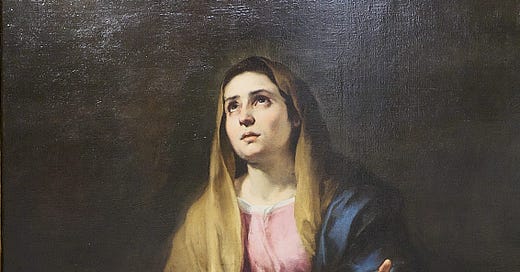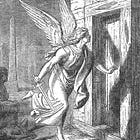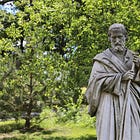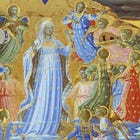When did Our Lady became the Mother of Sorrows? Fr Coleridge SJ
The change brought by St Simeon's announcement of the sword and Our Lady's heart was as great as that of the Annunciation. This was the moment that she became the Mother of Sorrows, says Fr Coleridge.

From
The Thirty Years – Our Lord’s Infancy & Hidden Life
Fr Henry James Coleridge, 1885
Burns and Oates, London, 1915, pp 154-63. Headings and some line breaks added.
“Now for the first time she is raised to that pre-eminent throne of suffering.”
The change of joy into sorrow
Some of the saints tell us, that before the blessed Simeon uttered these words of mournful prophecy to the Blessed Mother of God, all that had passed at the mystery of the Purification in the Temple had been full of brightness and of joy. It could indeed hardly be otherwise, for what could be more joyous than the first Presentation of our Lord in the House of His Father? What could be more joyous than for that Blessed Virgin Mother to discharge the obligation of the law, which she so much loved, in that holy place where she had once lived, as in the sanctuary itself?
She had no need indeed for the purifying rites of that law, but that would only make it a greater consolation to her to discharge them, to exercise humility after the example of our Lord Himself, to hide her greatness and her glory in the holy offering and the sacred ceremonies which accompanied it, and to express her intense and boundless thankfulness for the mercies of God to her.
It was a joy to see the work of redemption so far advanced, to see the Redeemer Himself undertaking the work solemnly, by His oblation of Himself to His Father, and then that joy which was in the hearts of that Blessed Lady and St. Joseph was, as it were, doubled and trebled by the sudden coming in of the holy man Simeon, and by the wonderful words in which he gave thanks to God for the blessing of being allowed to see that Holy Child.
It is always a joy to holy souls to communicate one with the other their feelings of thankfulness, and to speak together of the mighty mercies and goodness of God. And so it might have seemed that this mystery of the Purification was to pass away in the same unbroken joyousness as that of the Visitation, as if the Canticle of Simeon had taken up the echoes of the Magnificat, and as if the blessed company of saints might part in peace, full of thankfulness and holy joys.
Sudden revelation to Simeon
But as the saints tell us, our Lady saw a sudden cloud overspread the face of that venerable man, who had held our Lord in his arms. She saw his colour fade, his cheek grow pale, his steps totter, he seemed to be struck with a sudden blow as of death.
For then God revealed to him the future of that Blessed Child, all the contradiction and persecution and opposition, the warfare against Him of slander and calumny, of treachery and conspiracy, His bitter enemies and His false friends, the black ingratitude and perfidy, and at last the issue of all in the Cross planted on Calvary. All this that blessed old man saw, and his soul was pierced through and through with the sorrow of the prevision of the Cross.
And then, in obedience to the inspiration of God, he gave forth the prophecy, sad and terrible enough to change all the joy of the Purification into the deepest woe, how the Child was set for the fall and rising again of many, and for a sign of contradiction, and then he had to add, “Yea, and thine own soul a sword shall pierce.” And so the mystery which began in joy came to its close in sorrow, the brightness of their approach to the Temple of God was changed into a most mournful departure, and a cloud settled on the Heart of that Blessed Mother, which never left it from that day, “and thine own soul a sword shall pierce!”
We need not doubt that this contemplation is founded on the truth. For it is nothing wonderful that a prophet like this holy Simeon should have suddenly revealed to him the certainty of so great a feature in the history of our Lord as this of the Cross, without having known it before. The prophets, as St. Paul tells us, know in part, and prophesy in part. That is, they know what is revealed to them of the counsel of God, for some particular purpose, but they do not know the whole counsel of God.
And so this blessed soul may have known the Child in his arms to be the Redeemer of Israel, and yet he may not have had a revelation, before that moment, of the mystery of the Cross. For our Blessed Lady it may not have been so, for her intelligence of the prophecies was far greater and deeper than that of any of the saints of God. It is not probable that the meaning of so many of the Psalms which speak of the Passion, or of some of the prophecies of Isaias and Jeremias, could have been hidden from her. She must have known that the Redeemer of the world was to redeem the world by suffering.
But yet this revelation now made to her by the mouth of holy Simeon may have struck on her heart as new. For she may have known it before as a conclusion of her own mind, formed from a consideration of what God had predicted. She was now to know it by means of a special declaration from God by the mouth of the prophet, accompanied by a wonderful illumination of her mind as to the future mystery.
The change in Our Lady
There are many things which we expect and think likely or certain, but it is a new thing when we are told at last that so it must be. We know how we often think it likely that our sick friends are to die, when they are laid on the bed of sickness, and day after day passes without recovery, and with constant waning of vital force, yet it is a new revelation to us when the priest of God or the physician leans over and tells us that there is no hope. So it must have been with that most tender Heart of the Virgin Mother.
She had now for some six weeks possessed her new-born treasure, after having worshipped Him present in her womb for nine months before He was born. And now, in the very moment, so to say, of her triumph, when the Temple of God had received Him, and the saints and the priest of God had come, as it were, to welcome Him, in the name of His Father, these few words sound in our ears, and she is at once crowned the Mother of Dolours.
Now there is no longer any uncertainty. Now God had spoken by the priest and the prophet, who has proved his mission by recognizing the Holy Child when no others recognized Him. Now for the first time she is raised to that pre-eminent throne of suffering. Henceforth she is the Mater Dolorosa. It was a change almost as great as that which came over her after the Incarnation, when in a moment she had become the Mother of God. Well, indeed, may she have kept these things in her heart. From that day to the end of her life the sword was working there.
Nothing is said to St Joseph
Again, it is very remarkable that, although this holy Prophet is said to have blessed both our Lady and St. Joseph, he is not said to have addressed any word to the latter about his future sufferings, as he did to Mary.
It is very true indeed, that, high as was the position of St. Joseph, as Head of the Holy Family, it was not so high, in the eyes of God, as that of our Blessed Lady. Moreover, St. Joseph might appear, in the eyes of men, at the Presentation in the Temple, as at the Nativity, the Circumcision, the Epiphany, and all through the Sacred Infancy, as the natural father of the Holy Child.
But to an eye enlightened as to the secrets of God, such as that of this Prophet, he would appear, as he was, and the language of St. Simeon may be understood as showing that he understood perfectly well the secret of the Virginal Conception and Childbearing.
But, in truth, there is no need for considerations of this kind to explain the omission, in this prophecy, of any word which has special relation to St. Joseph. That blessed Prophet would not see, in any vision that might be vouchsafed to him, the anguish of Joseph by the side of that of Mary. The Providence of God had ordained that the life of St. Joseph should cease when his office had been discharged, and that he was not to witness that manifestation of our Lord to the people which took place when the Public Life began.
Prior sufferings and the design of God
Our Lady indeed, and St. Joseph also, had much interior suffering on our Lord’s account, even before His preaching began. Within no long time from this bright and beautiful day of the Purification was to follow the Epiphany. The holy Kings were already on their way from the East, and they would knock, as it were, ere long, at the doors of the unconscious city of Jerusalem, which had now received the promised visit of her Lord to His Temple, and had not known Him. On the Epiphany would follow the Flight, the Massacre of the Children, the exile in Egypt. These were swords to the heart of Mary, and they must have pierced deeply also the heart of Joseph. So, too, he was to share with her the mysterious sorrow of the Losing of our Lord in the Temple. But he was to be called away to the other world before the great time of the contradictions began.
Thus the omission of all reference to him, in the prophecy of Simeon, is a proof that the holy Prophet was divinely guided alike in what he did say and what he did not say. It is not impossible that this omission may have been noticed, both by St. Joseph and by our Blessed Lady. They may perhaps have understood it as implying that they were to be separated before the time came of which the Prophet spoke. Or this may have been one of those things on which they pondered and meditated devoutly, without, as yet, any distinct intelligence of their meaning.
We have already said something about the designs of God in making this announcement to our Blessed Lady at this early stage of the life of our Lord. The glory of God may have been greatly increased thereby, on account of the beautiful virtues which this knowledge of the future would call forth in the soul of the Blessed Mother. It must have been greatly for the consolation of the Sacred Heart that she should be from the very beginning, the companion of Its secret thoughts. It must have given Mary immense opportunities of merit, and have been the foundation of more than one of her singular privileges, and in this also it must have secured immense advantages to us by the increase, both of her love for those for whom her Son was to suffer, and of her power to help us in the participation of the fruits of His sufferings.
The “Mother of Sorrows”
Further, the knowledge that she was all her life from this moment the Mother of Sorrows cannot but soften still more our hearts towards her, and add to the love and devotion which we already bear her, to our confidence in her tender care for us, and our desire to love her Son as she desires Him to be loved.
Thus this unexpected prophecy of the blessed Simeon was the most important of all the incidents of this glorious day. There was nothing to prepare for it, it was not necessary for the fulfilment of the promise which had been made to Simeon, it was not required as a part of the solemn recognition and honour which were, in a certain sense, due to our Lord on His first appearance in the Temple. The Purification and Presentation are complete without it.
It seems a sort of fortuitous addition to the mystery of the Purification. And yet it may have been the very design of God that Simeon should then meet our Lady, for the express purpose of delivering this message. Certainly it must have produced a greater change in the thoughts and anticipations of the Holy Mother than any other incident of the day.
Not overwhelmed
It must not be supposed that our Blessed Lady was overwhelmed with grief in any merely human way at this announcement to her on the part of God concerning her future sufferings.
In her, by the special grace of God, the utmost tenderness of affection, the keenest possible perception of pain on account of the treatment of her Son, of the malice of the world, of the misery of the human souls who were to cost Him so much grief, and of all that there was to be in the whole history that could cause anguish to her motherly heart for the sake of our Lord and those whom He loved at such a price, were combined with the most perfect union to the will of God, the most enlightened discernment of the wonderful beauty and wisdom of all His decrees, the most absolute confidence in His power and intention to reward abundantly and superabundantly whatever was suffered for His sake, and a most ardent desire to bear her part to the utmost in sharing the Cross of her Son as far as it was possible for her to share it.
Mary’s life had been far more a life of Heaven than of earth. She measured all things by the measure of Heaven and of eternity. And she was, moreover, as has been said, wonderfully enlightened as to the meaning of the prophecies, and the words of Simeon would give to them many new meanings on which her mind and heart would feed.
More than martyrdom – a great advance in grace
But she would not the less feel most intensely the sorrow which was thus announced to her as her portion for the rest of her life. It was more than a martyrdom to which she was now sentenced. The pains of the body are as nothing to the pangs of the soul, and these are more keen and piercing in proportion to the perfection of the soul in itself, to its estimation of and love for our Lord when His sufferings are the subject of the anguish which is felt.
On all these accounts it is no exaggeration to say that the martyrdom of our Blessed Lady was more severe than that of any of those who are commonly honoured as martyrs in the Church.
It is also true that, humanly speaking, she had little to prepare her for this great blow at this time. For since the Incarnation she had had trials indeed, but still her life had been a succession of most transporting joys, and she had lived among those who understood our Lord’s dignity, and honoured Him with the most devout reverence.
Notwithstanding all this, the grace and fortitude of our Lady’s soul were so great, that although this announcement had so much of unexpectedness about it, and was in itself so severe, still it did not disturb the tranquil serenity of that Blessed Mother, nor task too strongly either her obedience or her resignation. She offered herself to the accomplishment of the will of God in her Son and in herself, with the most heroic resignation and the most perfect submission.
At the same time we cannot doubt that this was another occasion for a great advance in the graces communicated to her soul. The announcement of Simeon was in itself a demand on her courage and fidelity which had never been equalled in its own kind, and it implied the duty of a constant correspondence on her part to the requirements of the highest perfection throughout the long years which were to follow. God could not make so large a demand on the fidelity of His handmaid without, at the same time, giving her all the strength of soul which that demand implied, and her faithfulness under the blow must have won her ever more and more fresh increases of grace.
A new field for the exercise of the highest virtue was now thrown open to her, and her perfect companionship with the Heart of her Son, and all His sufferings and aspirations, was secured at the cost of a continual interior cross resembling as closely as possible His own. If God had not designed to crown her so magnificently as the Mother of Sorrows, we may venture to think this would not have been so.
The dignity and power which were to be founded on so extraordinary an amount of suffering must indeed be great. The words of Simeon mark the first intimation in the Gospel History of the supreme state and power of Mary in the Kingdom of her Son, because they associate her so very closely to the sufferings on which that Kingdom is founded.
From Fr Henry James Coleridge, The Thirty Years, Our Lord’s Infancy & Hidden Life, ‘The Circumcision’, published 1885, this edition Burns and Oates, London, 1915, pp 154-63
Further Reading
See also The WM Review’s Fr Henry James Coleridge SJ Archive
HELP KEEP THE WM REVIEW ONLINE!
As we expand The WM Review we would like to keep providing free articles for everyone.
Our work takes a lot of time and effort to produce. If you have benefitted from it please do consider supporting us financially.
A subscription from you helps ensure that we can keep writing and sharing free material for all. Plus, you will get access to our exclusive members-only material.
(We make our members-only material freely available clergy, priests and seminarians upon request. Please subscribe and reply to the email if this applies to you.)
Subscribe now to make sure you always receive our material. Thank you!
Follow on Twitter, YouTube and Telegram:







